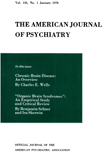Therapists' recognition of psychopathology: a model for quality review of psychotherapy
Abstract
In this study 32 randomly selected psychiatric emergency room patients, who were in concurrent psychotherapy, completed the SCL-90 and a clinically oriented questionnaire. Their therapists independently rated the patients' degree of psychopathology on the nine SCL-90 symptom scales. Therapists were highly efficient in recognizing depression (94% of the cases) and anxiety (89%) but not psychotic (35%) and obsessive- complusive (16%) pathology. Variables significantly associated with the therapists' nonrecognition of psychopathology were the diagnosis of borderline, the patient's expression of inadequacy in comparison to the therapist, the patient's fear of offending the therapist, and the patient wanting but not receiving empathy from the therapist. The authors discuss the implications of these findings for peer review and further research.
Access content
To read the fulltext, please use one of the options below to sign in or purchase access.- Personal login
- Institutional Login
- Sign in via OpenAthens
- Register for access
-
Please login/register if you wish to pair your device and check access availability.
Not a subscriber?
PsychiatryOnline subscription options offer access to the DSM-5 library, books, journals, CME, and patient resources. This all-in-one virtual library provides psychiatrists and mental health professionals with key resources for diagnosis, treatment, research, and professional development.
Need more help? PsychiatryOnline Customer Service may be reached by emailing [email protected] or by calling 800-368-5777 (in the U.S.) or 703-907-7322 (outside the U.S.).



